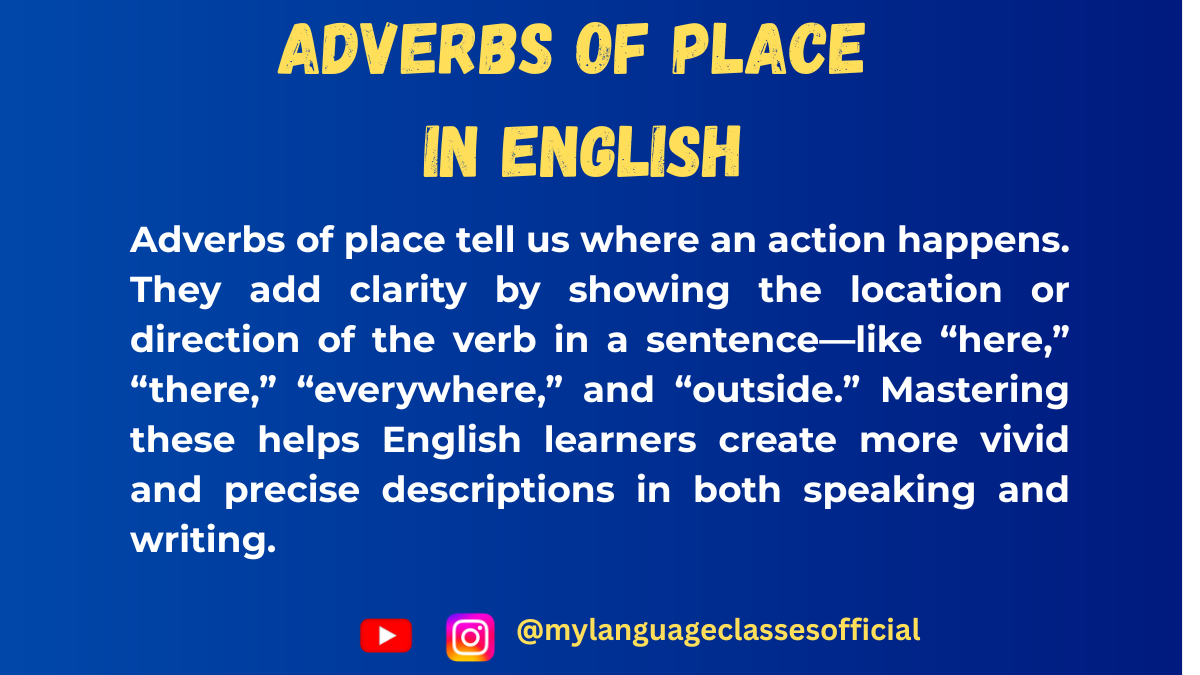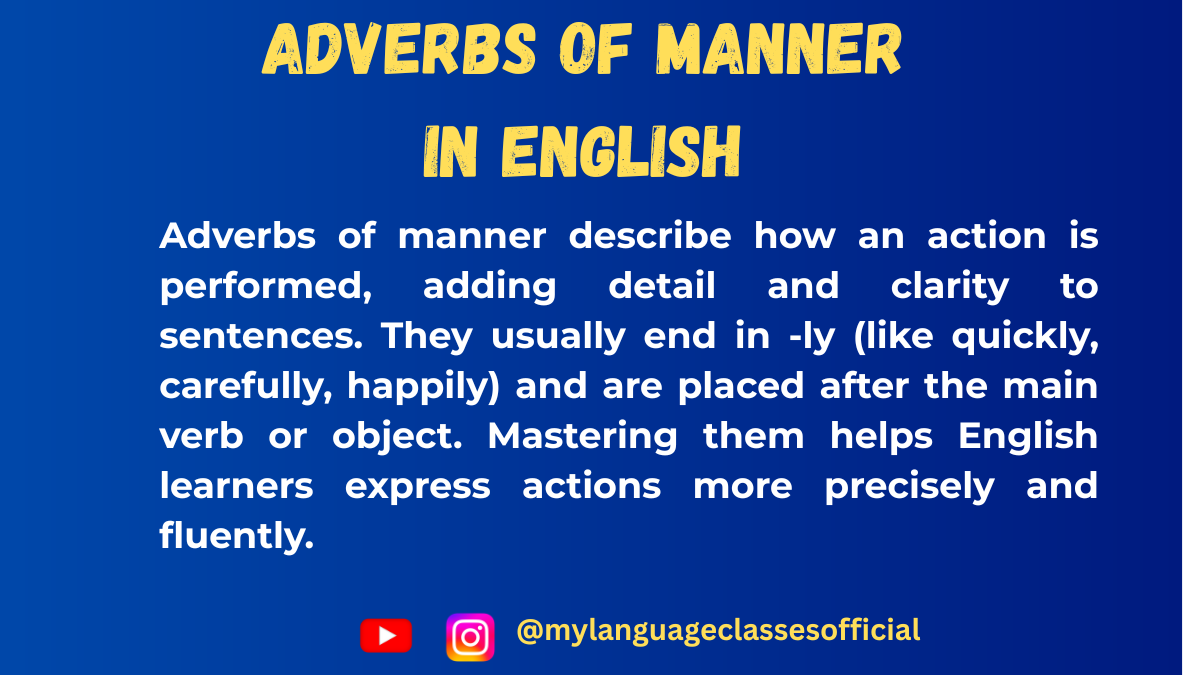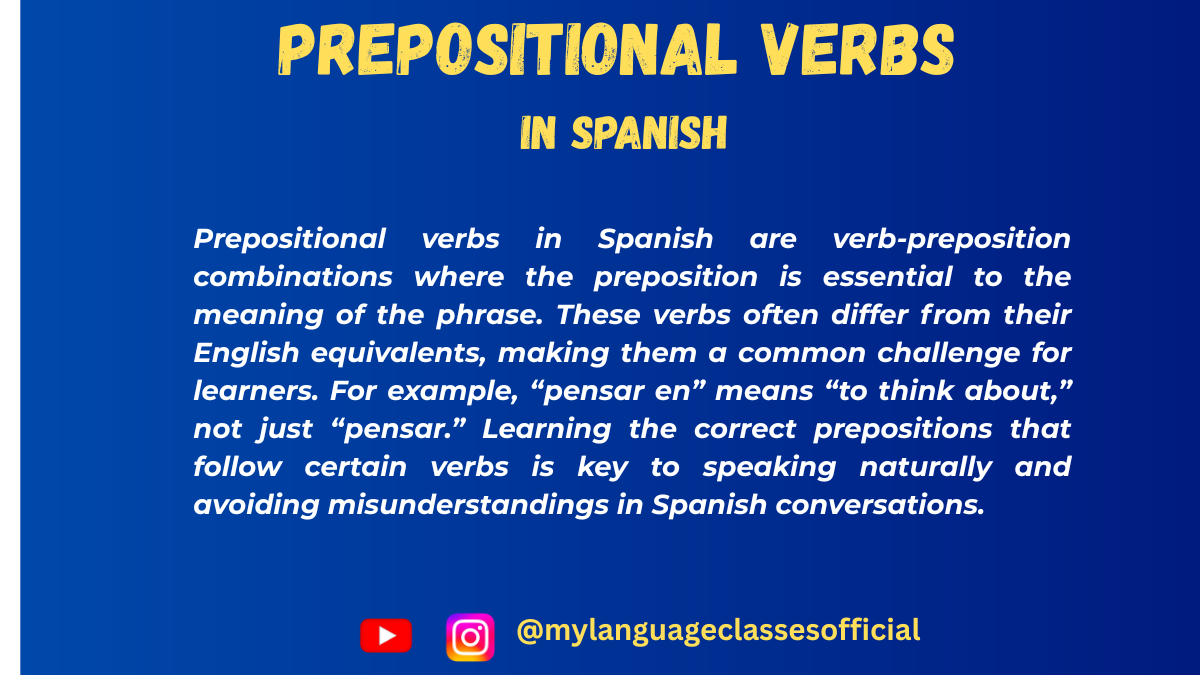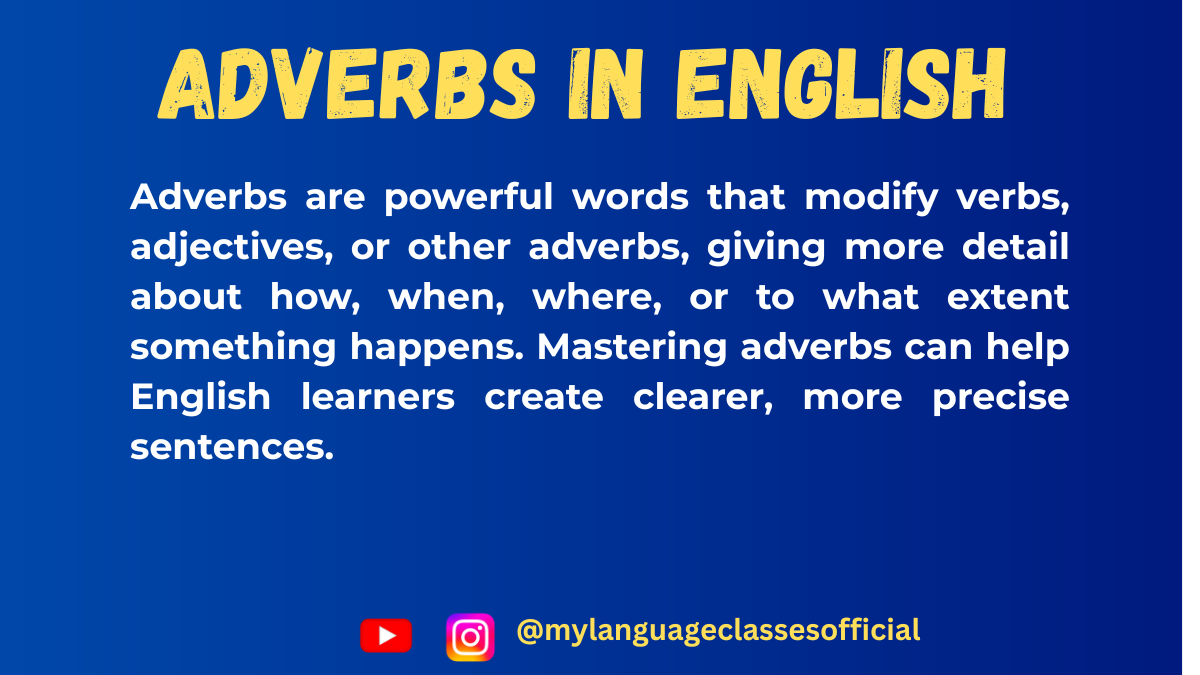Your cart is currently empty!
Tag: world of languages
-
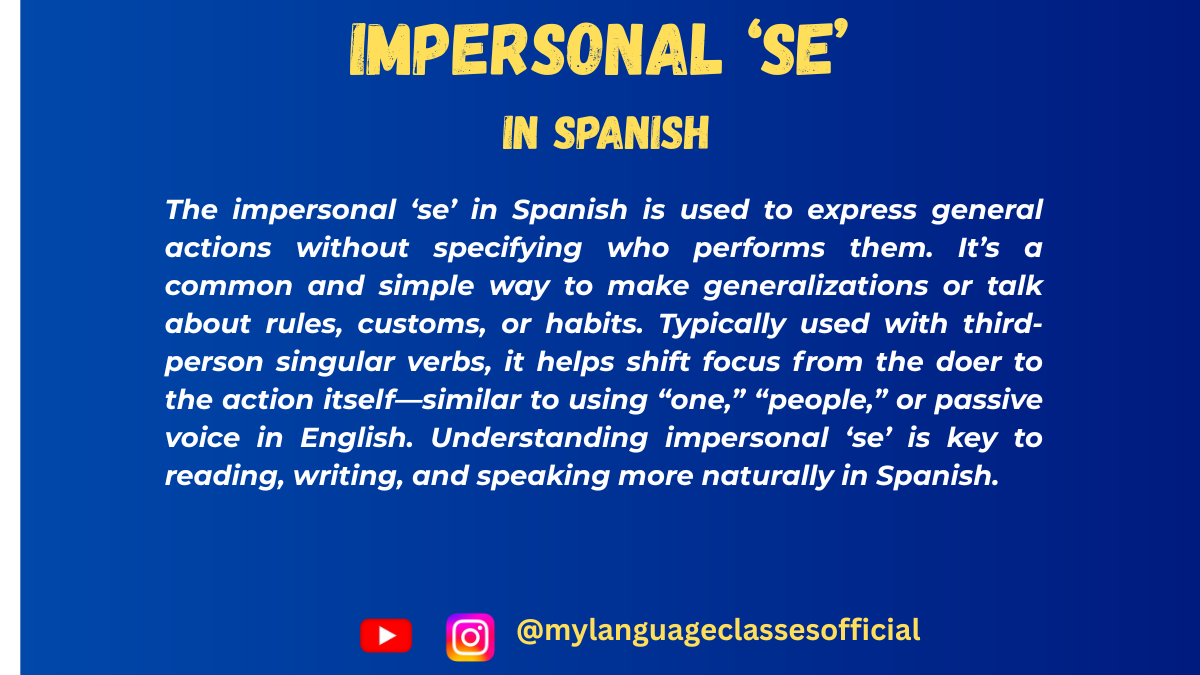
Impersonal “Se” in Spanish Grammar
The impersonal “se” is a crucial aspect of Spanish grammar that allows speakers to express general statements without specifying a subject. It is commonly used in formal speech, instructions, advertisements, and everyday conversation. Understanding impersonal “se” enhances fluency and helps learners sound more natural in Spanish.
This guide will explore the meaning, usage, rules, and examples of impersonal “se” with structured explanations, tables, and exercises.
Common Expressions Using Impersonal “Se”
Here are some common daily expressions using impersonal “se” in Spanish:
- Se habla español. (Spanish is spoken here.)
- Se dice que va a llover. (It is said that it will rain.)
- Se busca camarero. (Waiter wanted.)
- No se permite fumar. (Smoking is not allowed.)
- Se necesita ayuda. (Help is needed.)
- Se vive bien aquí. (One lives well here.)
- Se recomienda paciencia. (Patience is recommended.)
- Se come bien en este restaurante. (People eat well in this restaurant.)
- Se venden coches aquí. (Cars are sold here.)
- Se aprende mucho en esta escuela. (One learns a lot in this school.)
Grammar Rules
How “Se” Works in Impersonal Sentences
- Impersonal “se” is used with third-person singular verbs.
- It does not refer to a specific subject.
- It is often followed by an infinitive or a noun.
- When followed by a plural noun, the verb agrees in plural form.
Common Sentence Structures
Singular Form:
- Se necesita paciencia. (Patience is needed.)
- Se cree que ella es honesta. (It is believed that she is honest.)
Plural Form:
- Se venden frutas frescas. (Fresh fruits are sold.)
- Se contratan empleados nuevos. (New employees are hired.)
When to Use Impersonal “Se”
1. General Statements
Used when making general claims without specifying a subject.
- Se dice que la ciudad es hermosa. (It is said that the city is beautiful.)
- Se piensa que es una buena idea. (It is thought to be a good idea.)
2. Rules & Prohibitions
Used in warnings, rules, or public signs.
- No se permite fumar aquí. (Smoking is not allowed here.)
- Se prohíbe el acceso sin autorización. (Access is prohibited without authorization.)
3. Passive Voice Alternative
Used instead of passive voice for natural-sounding Spanish.
- Se construyó la casa en 1990. (The house was built in 1990.)
- Se ha cambiado la dirección. (The address has been changed.)
4. Unspecified Subjects
Used when referring to people in general.
- Se come bien en México. (People eat well in Mexico.)
- Se duerme mejor con una buena almohada. (One sleeps better with a good pillow.)
Conjugation
Regular Verbs
Verb Infinitive Impersonal Form Hablar Hablar Se habla español. Comer Comer Se come bien aquí. Vivir Vivir Se vive en paz. Irregular Verbs
Verb Infinitive Impersonal Form Decir Decir Se dice la verdad. Hacer Hacer Se hace el trabajo rápidamente. Ver Ver Se ve el mar desde aquí.
Things to Keep in Mind
- “Se” is always used with third-person singular or plural verbs.
- It does not refer to a specific subject.
- When a plural noun follows, use a plural verb.
Example Table
Example Sentence (Spanish) English Translation Se vende pan fresco. Fresh bread is sold. Se aprende rápido. One learns quickly. Se busca profesor de inglés. An English teacher is wanted. Se necesita ayuda. Help is needed. Se prohíbe la entrada. Entry is prohibited. Se recomienda paciencia. Patience is recommended. Se vive bien en esta ciudad. One lives well in this city. Se come mejor aquí. One eats better here. Se trabaja mejor con buena luz. One works better with good lighting. Se dice que es un buen país. It is said that it is a good country. Se piensa que lloverá mañana. It is thought that it will rain tomorrow. Se llega temprano a la escuela. One arrives early at school. Se habla rápido en algunas regiones. People speak fast in some regions. Se duerme mejor con una manta. One sleeps better with a blanket. Se trabaja bien bajo presión. One works well under pressure.
More Example Sentences
- Se alquilan apartamentos cerca de la playa. (Apartments for rent near the beach.)
- Se recomienda leer antes de dormir. (Reading before sleeping is recommended.)
- Se come paella en España. (People eat paella in Spain.)
- Se necesita paciencia para aprender un idioma. (Patience is needed to learn a language.)
- Se buscan voluntarios para el evento. (Volunteers are wanted for the event.)
- Se ve mejor desde aquí. (It is seen better from here.)
- Se trabaja mejor con buena luz. (One works better with good lighting.)
- Se aprende rápido con práctica. (One learns quickly with practice.)
- Se habla francés en Canadá. (French is spoken in Canada.)
- Se dice que el clima cambiará pronto. (It is said that the weather will change soon.)
Exercise
Fill in the blanks with the correct form using the impersonal “se.”
- _______ (hablar) español en muchos países del mundo.
- _______ (comer) mucha paella en Valencia.
- _______ (prohibir) fumar en lugares públicos.
- _______ (vender) ropa de alta calidad en esta tienda.
- _______ (necesitar) experiencia para este trabajo.
- _______ (usar) demasiado plástico en el mundo.
- _______ (ver) muchas películas extranjeras en este cine.
- _______ (recomendar) hacer ejercicio todos los días.
- _______ (decir) que el desayuno es la comida más importante del día.
- _______ (aprender) español fácilmente con práctica diaria.
Answers:
- Se habla español en muchos países del mundo. (Spanish is spoken in many countries around the world.)
- Se come mucha paella en Valencia. (A lot of paella is eaten in Valencia.)
- Se prohíbe fumar en lugares públicos. (Smoking is prohibited in public places.)
- Se vende ropa de alta calidad en esta tienda. (High-quality clothing is sold in this store.)
- Se necesita experiencia para este trabajo. (Experience is needed for this job.)
- Se usa demasiado plástico en el mundo. (Too much plastic is used in the world.)
- Se ven muchas películas extranjeras en este cine. (Many foreign movies are watched in this cinema.)
- Se recomienda hacer ejercicio todos los días. (It is recommended to exercise every day.)
- Se dice que el desayuno es la comida más importante del día. (It is said that breakfast is the most important meal of the day.)
- Se aprende español fácilmente con práctica diaria. (Spanish is learned easily with daily practice.)
Conclusion
Mastering the impersonal “se” helps Spanish learners communicate effectively and naturally. This structure is essential in everyday speech, formal writing, and professional settings. By practicing and using the impersonal “se” in real-life situations, you can enhance your fluency and sound more like a native speaker.
Keep practicing, and soon, using “se” will become second nature!
If you enjoyed this lesson, be sure to check out more posts like this on my blog at My Language Classes. Don’t forget to subscribe my YouTube channel and follow me on Instagram for the latest language learning tips and lessons. Leave a comment below to share your thoughts, or ask any questions you have about nouns.
Happy learning! 😊
- 100 Spanish Example Sentences
- 100 Spanish Fill-in-the-Blanks Exercises
- 100 Spanish Vocabulary Lists
- Spanish – Advanced
- Spanish – Beginner
- Spanish – Intermediate
-
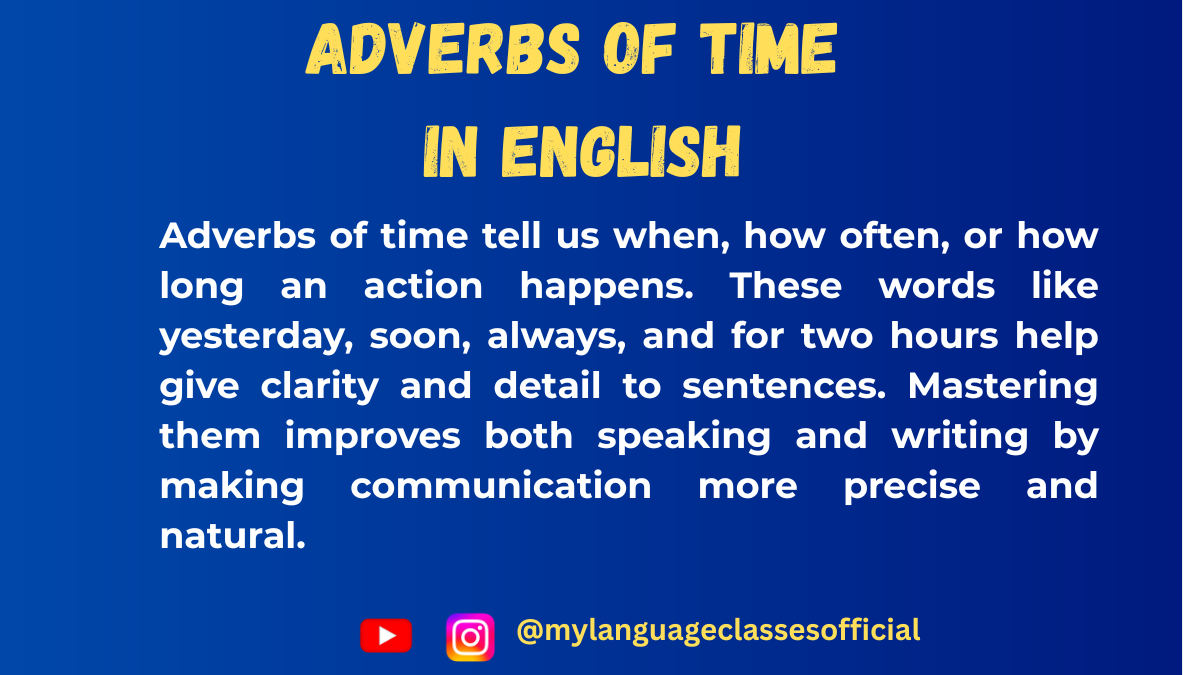
Adverbs of Time in English Grammar
Adverbs of time are an essential part of English grammar, as they help describe when an action takes place. They provide clarity to sentences by indicating past, present, or future time and are commonly used in both spoken and written English.
Understanding adverbs of time is crucial for effective communication, as they allow speakers and writers to express when an event happens, how often it occurs, and for how long. Without these adverbs, sentences can lack important time-related details, leading to confusion.
In this blog post, we will explore common adverbs of time, their grammar rules, different usage scenarios, and example sentences. Additionally, we will provide a practice exercise to help reinforce your understanding of this topic. By the end of this guide, you will have a strong grasp of how to use adverbs of time correctly and naturally in your conversations and writing.
Common Expressions Using Adverbs of Time
Adverbs of time often appear in common everyday expressions that we use in conversations. These expressions help clarify when events occurred, are occurring, or will occur. Below is a list of common expressions and phrases that include adverbs of time:
- At the moment – Refers to the present time.
Example: “I’m busy at the moment.” - In a while – Refers to a short period of time in the future.
Example: “I’ll be there in a while.” - At once – Refers to doing something immediately.
Example: “Please respond at once.” - Every day – Refers to daily frequency.
Example: “I go to the gym every day.” - Right now – Refers to the immediate present.
Example: “I need your help right now.” - Later on – Refers to a time after the present.
Example: “We will discuss this later on.” - Soon after – Refers to something happening shortly after.
Example: “The meeting ended, and soon after, I left.” - At times – Indicates occasional occurrence.
Example: “At times, I feel overwhelmed with work.” - In the past – Refers to a time that has already passed.
Example: “I lived in Canada in the past.” - Once in a while – Indicates infrequent occurrence.
Example: “I treat myself to chocolate once in a while.”
Grammar Rules for Using Adverbs of Time
Adverbs of time have specific grammatical rules that govern their use. Understanding these rules will ensure that you use these adverbs correctly in your sentences.
General Structure
- Position in the Sentence: Adverbs of time generally appear at the end of the sentence, but they can also appear at the beginning or in the middle depending on the emphasis and context.
- Example (end): “She called yesterday.”
- Example (beginning): “Yesterday, she called.”
- Example (middle): “She always calls at night.”
- Use of Articles: Adverbs of time do not require articles, as they modify the verb and indicate the time of the action.
- Plural and Gender: Adverbs of time do not change based on number or gender. They are invariant.
- Types of Adverbs of Time:
- Definite: Refers to specific times (e.g., “now,” “today,” “yesterday”).
- Indefinite: Refers to general time periods (e.g., “soon,” “later,” “soon after”).
Common Adverbs of Time and Example Sentences
Here’s a list of common adverbs of time along with example sentences:
- Now: “She is working now.”
- Soon: “We will leave soon.”
- Yesterday: “I visited the museum yesterday.”
- Today: “The weather is perfect today.”
- Later: “I will call you later.”
- Before: “She had left before I arrived.”
- Afterwards: “We went for coffee afterwards.”
- Always: “I always drink coffee in the morning.”
- Never: “I never go to bed late.”
- Often: “She often goes for a walk in the evening.”
- Frequently: “He frequently travels for work.”
- Seldom: “I seldom watch TV.”
When to Use Adverbs of Time
Adverbs of time are used in various situations to give more information about the time frame of an action. Below are the key situations where adverbs of time are used, along with examples:
1. Present Time
Adverbs of time are commonly used to talk about actions happening now or regularly.
- Example: “She always drinks tea in the morning.”
- Usage: In habitual actions or routines.
2. Past Time
Adverbs of time indicate that an action occurred at a specific time in the past.
- Example: “I visited Paris last summer.”
- Usage: To describe something that happened in the past.
3. Future Time
Adverbs of time are used to express when something will happen in the future.
- Example: “We will meet tomorrow.”
- Usage: To indicate future actions or events.
4. To Indicate Frequency
Adverbs like always, never, and often describe how frequently something happens.
- Example: “I always go for a jog in the evening.”
5. To Specify Duration
Adverbs like for and since specify the length of time for which something happens.
- Example: “She has been waiting since 10 AM.”
6. To Indicate Immediacy
Adverbs like now, immediately, and right away indicate that an action is taking place at this moment or will take place immediately.
- Example: “I need to leave right now.”
Things to Keep in Mind
When using adverbs of time, there are a few things to consider to ensure you don’t make mistakes. Here are some tips and tricky points:
- Placement of Adverbs:
- While adverbs of time usually go at the end of a sentence, they can also go at the beginning for emphasis.
- Incorrect: “She will never forget this.”
- Correct: “She will never forget this.”
- Use of Tenses:
- Pay attention to the tense when using adverbs of time. For example, use yesterday with past tense, and soon with future tense.
- Avoid Overuse:
- Don’t overuse adverbs of time like always, never, and often. Using them too much can make your sentences sound repetitive.
Example Table
Here are some example sentences that demonstrate the use of adverbs of time in different contexts:
Adverb of Time Sentence Now She is eating now. Later I will visit you later. Yesterday He arrived yesterday. Tomorrow We are leaving tomorrow. Soon She will call soon. Never I never go to bed late. Always I always wake up early. Afterward We went to the park afterward. Before He left before I arrived. Sometimes I sometimes skip breakfast. Seldom She seldom eats junk food. Occasionally We meet occasionally. Frequently He travels frequently for work. In the past I lived in London in the past. Once in a while I go to the movies once in a while.
More Example Sentences
- She went for a walk right now.
- I see him frequently at the library.
- Every day, I learn something new.
- We will start the meeting in a few minutes.
- I met her once in Paris.
- I plan to finish my work soon.
- He called me yesterday.
- I will tell you everything later.
- I’m visiting my parents this weekend.
- She always helps me with my homework.
Exercise
Fill in the blanks with the appropriate adverb of time:
- I am going to the gym _______.
- She leaves work _______.
- We will have dinner _______.
- He arrived _______.
- I will call you _______.
- She comes to the office _______.
- The concert will start _______.
- I have not seen him _______.
- They will arrive _______.
- I see my friends _______.
Answers:
- I am going to the gym every day.
- She leaves work early.
- We will have dinner soon.
- He arrived yesterday.
- I will call you later.
- She comes to the office every morning.
- The concert will start in an hour.
- I have not seen him for a long time.
- They will arrive tomorrow.
- I see my friends occasionally.
Conclusion
Mastering adverbs of time is essential for clear and effective communication in English. With the knowledge of how to use these adverbs, when to use them, and the rules governing their usage, you will improve your speaking and writing skills. Be mindful of placement, tense, and the frequency of adverbs to avoid errors. Keep practicing, and soon you will use adverbs of time like a pro!
👉 Visit our blog: mylanguageclassesblog.wordpress.com
👉 Follow on Instagram for daily tips
👉 Subscribe on YouTube for fun grammar videos.Let’s grow your English fluency together—one word at a time!
- At the moment – Refers to the present time.
-
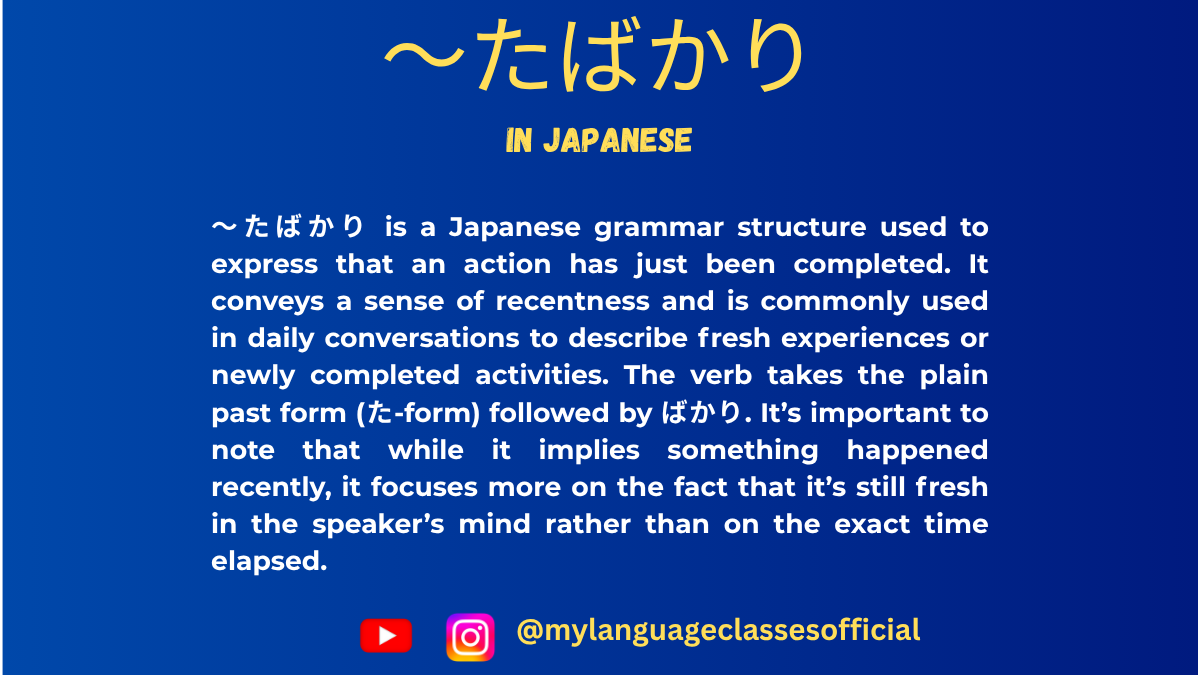
Using 〜たばかり in Japanese | My Language Classes
Mastering the Japanese Grammar Point 〜たばかり (Just Did)
If you’re learning Japanese, you’ve likely encountered situations where you want to express that you’ve “just done” something. Enter 〜たばかり (ta bakari), a handy grammar point that allows you to convey exactly that! Whether you’re talking about finishing a meal, starting a new job, or arriving at a location, 〜たばかり is essential for natural-sounding Japanese.
This grammar point is widely used in both spoken and written Japanese, making it a must-know for learners. In this blog, we’ll break down everything you need to know about 〜たばかり, including its formation, usage, common mistakes, and plenty of examples to help you master it.
When to Use 〜たばかり (Just Did)
〜たばかり is used to express that an action has just been completed. It emphasizes that the action happened very recently, often with the implication that the effects or results are still fresh.
Example Sentences:
- 食べたばかりです。
Tabeta bakari desu.
I just ate. - 日本に来たばかりです。
Nihon ni kita bakari desu.
I just came to Japan. - 宿題を終わったばかりだ。
Shukudai o owatta bakari da.
I just finished my homework.
Formation & Structure
The formation of 〜たばかり is straightforward. It’s attached to the past tense (た-form) of verbs. Let’s break it down for all three types of verbs: Godan verbs, Ichidan verbs, and Irregular verbs.
1. Godan Verbs (五段動詞):
These verbs end in -u, -ku, -gu, -su, -tsu, -nu, -bu, -mu, or -ru (but not -eru or -iru).
- 行く (iku) → 行った (itta) → 行ったばかり (itta bakari)
Example:
電車が出たばかりです。
Densha ga deta bakari desu.
The train just left. - 飲む (nomu) → 飲んだ (nonda) → 飲んだばかり (nonda bakari)
Example:
コーヒーを飲んだばかりだ。
Koohii o nonda bakari da.
I just drank coffee.
2. Ichidan Verbs (一段動詞):
These verbs end in -eru or -iru.
- 食べる (taberu) → 食べた (tabeta) → 食べたばかり (tabeta bakari)
Example:
ご飯を食べたばかりです。
Gohan o tabeta bakari desu.
I just ate a meal. - 見る (miru) → 見た (mita) → 見たばかり (mita bakari)
Example:
映画を見たばかりだ。
Eiga o mita bakari da.
I just watched a movie.
3. Irregular Verbs (不規則動詞):
These verbs don’t follow standard conjugation rules.
- する (suru) → した (shita) → したばかり (shita bakari)
Example:
勉強をしたばかりです。
Benkyou o shita bakari desu.
I just studied. - 来る (kuru) → 来た (kita) → 来たばかり (kita bakari)
Example:
日本に来たばかりです。
Nihon ni kita bakari desu.
I just came to Japan.
Conjugation with Nouns and Adjectives:
While 〜たばかり is primarily used with verbs, it can also be used with nouns and adjectives in specific contexts.
Nouns:
- Noun + だった + ばかり
Example:
学生だったばかりです。
Gakusei datta bakari desu.
I was just a student.
Adjectives:
- い-Adjective (past tense) + ばかり
Example:
暑かったばかりです。
Atsukatta bakari desu.
It was just hot. - な-Adjective (past tense) + ばかり
Example:
静かだったばかりです。
Shizuka datta bakari desu.
It was just quiet.
Grammar Rules
Here’s a breakdown of the key rules for using 〜たばかり:
- Attach to the Past Tense: Always use the た-form of the verb before adding ばかり.
- Example: 書く (kaku) → 書いた (kaita) → 書いたばかり (kaita bakari)
- No Time Gap: 〜たばかり implies that the action was completed very recently. Avoid using it for actions that happened a long time ago.
- Formal vs. Informal:
- Formal: 〜たばかりです (ta bakari desu)
- Informal: 〜たばかりだ (ta bakari da)
Usage
〜たばかり is versatile and can be used in various contexts:
- Daily Conversations:
- 買い物をしたばかりです。
Kaimono o shita bakari desu.
I just went shopping.
- 買い物をしたばかりです。
- Written Language:
- 彼は大学を卒業したばかりだ。
Kare wa daigaku o sotsugyou shita bakari da.
He just graduated from university.
- 彼は大学を卒業したばかりだ。
- Formal Situations:
- 会議が終わったばかりです。
Kaigi ga owatta bakari desu.
The meeting just ended.
- 会議が終わったばかりです。
Common Mistakes & How to Avoid Them
Here are some common errors learners make with 〜たばかり and how to fix them:
- Incorrect Tense:
- Wrong: 食べるばかりです。
Taberu bakari desu. - Correct: 食べたばかりです。
Tabeta bakari desu.
(I just ate.)
- Wrong: 食べるばかりです。
- Using 〜たばかり for Old Actions:
- Wrong: 去年、日本に来たばかりです。
Kyonen, Nihon ni kita bakari desu. - Correct: 先週、日本に来たばかりです。
Senshuu, Nihon ni kita bakari desu.
(I just came to Japan last week.)
- Wrong: 去年、日本に来たばかりです。
Example Table
Part of Speech Word Example Sentence Romaji English Translation Verb 食べる (taberu) 彼はご飯を食べたばかりです。 Kare wa gohan o tabeta bakari desu. He just ate a meal. Verb 行く (iku) 空港に着いたばかりです。 Kuukou ni tsuita bakari desu. I just arrived at the airport. Verb 読む (yomu) この本を読んだばかりだ。 Kono hon o yonda bakari da. I just read this book. Verb 書く (kaku) 手紙を書いたばかりです。 Tegami o kaita bakari desu. I just wrote a letter. Verb 見る (miru) 映画を見たばかりです。 Eiga o mita bakari desu. I just watched a movie. Noun 仕事 (shigoto) 仕事が終わったばかりです。 Shigoto ga owatta bakari desu. I just finished work. Noun 旅行 (ryokou) 旅行から帰ったばかりです。 Ryokou kaeratta bakari desu. I just returned from a trip. Noun 宿題 (shukudai) 宿題を終わったばかりだ。 Shukudai o owatta bakari da. I just finished my homework. Noun 会議 (kaigi) 会議が終わったばかりです。 Kaigi ga owatta bakari desu. The meeting just ended. Noun 電話 (denwa) 電話をかけたばかりだ。 Denwa o kaketa bakari da. I just made a phone call.
More Examples Sentence
- 彼は結婚したばかりです。
Kare wa kekkon shita bakari desu.
He just got married. - このケーキを焼いたばかりです。
Kono keeki o yaita bakari desu.
I just baked this cake. - 電車が出たばかりだ。
Densha ga deta bakari da.
The train just left. - 彼女は泣いたばかりです。
Kanojo wa naita bakari desu.
She just cried. - 新しい仕事を始めたばかりだ。
Atarashii shigoto o hajimeta bakari da.
I just started a new job. - この本を買ったばかりです。
Kono hon o katta bakari desu.
I just bought this book. - 彼は出かけたばかりです。
Kare wa dekaketa bakari desu.
He just went out. - 昼ごはんを食べたばかりだ。
Hirugohan o tabeta bakari da.
I just ate lunch. - 映画館に着いたばかりです。
Eigakan ni tsuita bakari desu.
I just arrived at the movie theater. - 宿題を提出したばかりです。
Shukudai o teishutsu shita bakari desu.
I just submitted my homework.
Practice Exercises
- 彼は大学を______ばかりです。
Kare wa daigaku o ______ bakari desu.
(He just graduated from university.) - このケーキを______ばかりです。
Kono keeki o ______ bakari desu.
(I just baked this cake.) - 電車が______ばかりだ。
Densha ga ______ bakari da.
(The train just left.) - 彼女は______ばかりです。
Kanojo wa ______ bakari desu.
(She just cried.) - 新しい仕事を______ばかりだ。
Atarashii shigoto o ______ bakari da.
(I just started a new job.) - この本を______ばかりです。
Kono hon o ______ bakari desu.
(I just bought this book.) - 彼は______ばかりです。
Kare wa ______ bakari desu.
(He just went out.) - 昼ごはんを______ばかりだ。
Hirugohan o ______ bakari da.
(I just ate lunch.) - 映画館に______ばかりです。
Eigakan ni ______ bakari desu.
(I just arrived at the movie theater.) - 宿題を______ばかりです。
Shukudai o ______ bakari desu.
(I just submitted my homework.)
Answers:
- 卒業した
彼は大学を卒業したばかりです。
Kare wa daigaku o sotsugyou shita bakari desu. - 焼いた
このケーキを焼いたばかりです。
Kono keeki o yaita bakari desu. - 出た
電車が出たばかりだ。
Densha ga deta bakari da. - 泣いた
彼女は泣いたばかりです。
Kanojo wa naita bakari desu. - 始めた
新しい仕事を始めたばかりだ。
Atarashii shigoto o hajimeta bakari da. - 買った
この本を買ったばかりです。
Kono hon o katta bakari desu. - 出かけた
彼は出かけたばかりです。
Kare wa dekaketa bakari desu. - 食べた
昼ごはんを食べたばかりだ。
Hirugohan o tabeta bakari da. - 着いた
映画館に着いたばかりです。
Eigakan ni tsuita bakari desu. - 提出した
宿題を提出したばかりです。
Shukudai o teishutsu shita bakari desu.
Conclusion
Mastering 〜たばかり is a game-changer for expressing recent actions in Japanese. By understanding its formation, usage, and common pitfalls, you’ll be able to use this grammar point confidently in both spoken and written contexts. Remember to practice regularly and incorporate it into your daily conversations to reinforce your learning.
If you enjoyed this lesson, be sure to check out more posts like this on my blog at My Language Classes. Don’t forget to subscribe my YouTube channel and follow me on Instagram for the latest language learning tips and lessons. Leave a comment below to share your thoughts, or ask any questions you have about nouns.
Happy learning! 😊
- 食べたばかりです。
-
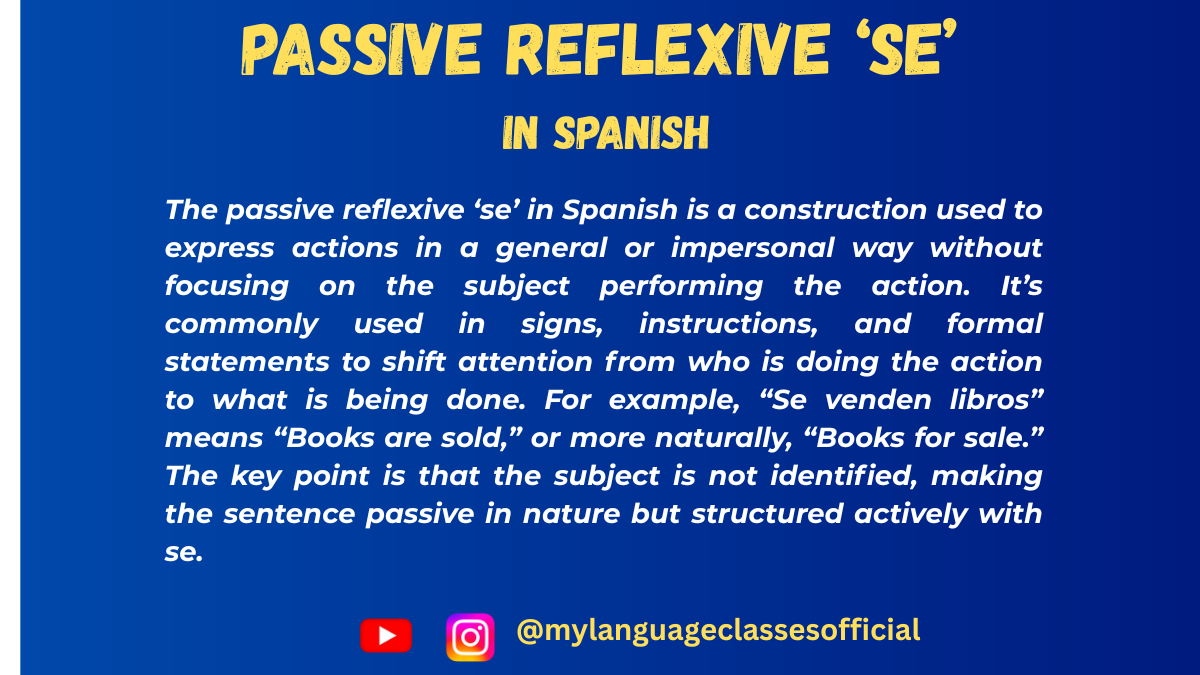
Mastering the Passive Reflexive ‘Se’ in Spanish
The passive reflexive ‘se’ is one of the most versatile and commonly used constructions in the Spanish language. It allows speakers to express actions in a way that emphasizes the action itself rather than who is performing it. This structure is particularly useful when the subject is unknown, irrelevant, or generalized. For example, instead of saying “Someone sells fruits here,” you can say “Se venden frutas aquí,” which translates to “Fruits are sold here.”
Understanding the passive reflexive ‘se’ is essential for achieving fluency in Spanish, as it appears frequently in both spoken and written language.
In this blog post, we’ll explore its usage, conjugation, common expressions, and everything you need to know to master this grammatical structure.
Common Expressions Using Passive Reflexive
The passive reflexive ‘se’ is used in many everyday expressions. Here’s a list of common ones:
- Se habla español – Spanish is spoken.
- Se venden casas – Houses are sold.
- Se necesita ayuda – Help is needed.
- Se prohíbe fumar – Smoking is prohibited.
- Se permite estacionar – Parking is allowed.
- Se dice que… – It is said that…
- Se recomienda reservar – It is recommended to book.
- Se ofrecen clases – Classes are offered.
- Se busca empleado – Employee wanted.
- Se alquila apartamento – Apartment for rent.
These expressions are widely used in signs, advertisements, and general conversation.
Things to Keep in Mind
When using the passive reflexive ‘se,’ there are a few key points to remember:
- Articles and Agreement: The verb must agree in number (singular or plural) with the subject. For example:
- Se vende la casa (The house is sold) – Singular.
- Se venden las casas (The houses are sold) – Plural.
- Gender Agreement: While the verb doesn’t change for gender, the noun or adjective accompanying it does. For example:
- Se venden camisas rojas (Red shirts are sold).
- No Specific Subject: The passive reflexive ‘se’ is used when the subject performing the action is either unknown or unimportant.
- Avoiding Redundancy: Unlike English, Spanish often omits the subject entirely when using the passive reflexive. For example, instead of saying “Se venden las manzanas por alguien” (Apples are sold by someone), simply say “Se venden las manzanas.”
When to Use the Passive Reflexive ‘Se’
The passive reflexive ‘se’ is used in the following situations:
- General Statements: When making broad or general statements.
- Se come bien en México (People eat well in Mexico).
- Impersonal Actions: When the subject is unknown or irrelevant.
- Se construyó este edificio en 1990 (This building was built in 1990).
- Instructions or Warnings: In signs, manuals, or public notices.
- Se prohíbe el paso (No entry allowed).
- Advertising or Offers: To promote products or services.
- Se venden coches usados (Used cars for sale).
Conjugation of Regular Verbs in Passive Reflexive
The passive reflexive ‘se’ is formed by combining the pronoun ‘se’ with the third-person singular or plural form of the verb, depending on the subject. Here’s how it works for regular verbs:
1. -AR Verbs
- Hablar (to speak): Se habla / Se hablan
- Se habla español aquí (Spanish is spoken here).
- Se hablan muchos idiomas (Many languages are spoken).
2. -ER Verbs
- Vender (to sell): Se vende / Se venden
- Se vende la casa (The house is sold).
- Se venden libros (Books are sold).
3. -IR Verbs
- Abrir (to open): Se abre / Se abren
- Se abre la tienda a las 9 (The store opens at 9).
- Se abren las ventanas (The windows are opened).
Irregular Verbs and Their Conjugation
Some irregular verbs also follow the passive reflexive structure. Here are a few examples:
- Hacer (to do/make): Se hace / Se hacen
- Se hace el trabajo (The work is done).
- Se hacen pasteles (Cakes are made).
- Decir (to say): Se dice / Se dicen
- Se dice que es verdad (It is said to be true).
- Se dicen muchas cosas (Many things are said).
- Poner (to put): Se pone / Se ponen
- Se pone la mesa (The table is set).
- Se ponen los libros aquí (The books are put here).
10 Regular Verbs in Passive Reflexive Form
Verb Example Sentence 1 Example Sentence 2 Hablar Se habla español aquí. (Spanish is spoken here.) Se hablan muchos idiomas. (Many languages are spoken.) Vender Se vende la casa. (The house is sold.) Se venden coches usados. (Used cars are sold.) Abrir Se abre la puerta. (The door is opened.) Se abren las ventanas. (The windows are opened.) Comer Se come bien en este restaurante. (People eat well at this restaurant.) Se comen las manzanas. (The apples are eaten.) Escribir Se escribe una carta. (A letter is written.) Se escriben libros interesantes. (Interesting books are written.) Leer Se lee el periódico. (The newspaper is read.) Se leen muchos libros. (Many books are read.) Cerrar Se cierra la tienda. (The store is closed.) Se cierran las ventanas. (The windows are closed.) Comprar Se compra pan fresco. (Fresh bread is bought.) Se compran regalos. (Gifts are bought.) Limpiar Se limpia la casa. (The house is cleaned.) Se limpian los platos. (The dishes are cleaned.) Usar Se usa el teléfono. (The phone is used.) Se usan computadoras. (Computers are used.)
More Example Sentences
- Se venden flores en el mercado. (Flowers are sold at the market.)
- Se necesita paciencia. (Patience is needed.)
- Se construyen casas nuevas. (New houses are built.)
- Se habla mucho de política. (Politics is talked about a lot.)
- Se permite nadar aquí. (Swimming is allowed here.)
- Se ofrecen descuentos. (Discounts are offered.)
- Se busca un perro perdido. (A lost dog is being searched for.)
- Se alquilan bicicletas. (Bicycles are rented.)
- Se recomienda llegar temprano. (It is recommended to arrive early.)
- Se dice que va a llover. (It is said that it will rain.)
Fill in the Blanks
- Se _______ (vender) frutas en el mercado.
- Se _______ (necesitar) más tiempo.
- Se _______ (hablar) español en Argentina.
- Se _______ (permitir) estacionar aquí.
- Se _______ (construir) un nuevo edificio.
- Se _______ (ofrecer) clases de yoga.
- Se _______ (buscar) un gato perdido.
- Se _______ (alquilar) coches baratos.
- Se _______ (recomendar) leer este libro.
- Se _______ (decir) que es verdad.
Answers:
- venden
- necesita
- habla
- permite
- construye
- ofrecen
- busca
- alquilan
- recomienda
- dice
Conclusion
The passive reflexive ‘se’ is a powerful and versatile tool in Spanish that allows you to express actions in a clear and concise manner. By mastering its usage, conjugation, and common expressions, you’ll be able to communicate more effectively and naturally in Spanish. Whether you’re reading signs, giving instructions, or making general statements, the passive reflexive ‘se’ will undoubtedly enhance your language skills.
Practice regularly, pay attention to agreement rules, and soon you’ll find yourself using this construction with confidence.
¡Buena suerte! (Good luck!)
If you enjoyed this lesson, be sure to check out more posts like this on my blog at My Language Classes. Don’t forget to subscribe my YouTube channel and follow me on Instagram for the latest language learning tips and lessons. Leave a comment below to share your thoughts, or ask any questions you have about nouns.
Happy learning! 😊
- 100 Spanish Example Sentences
- 100 Spanish Fill-in-the-Blanks Exercises
- 100 Spanish Vocabulary Lists
- Spanish – Advanced
- Spanish – Beginner
- Spanish – Intermediate
-
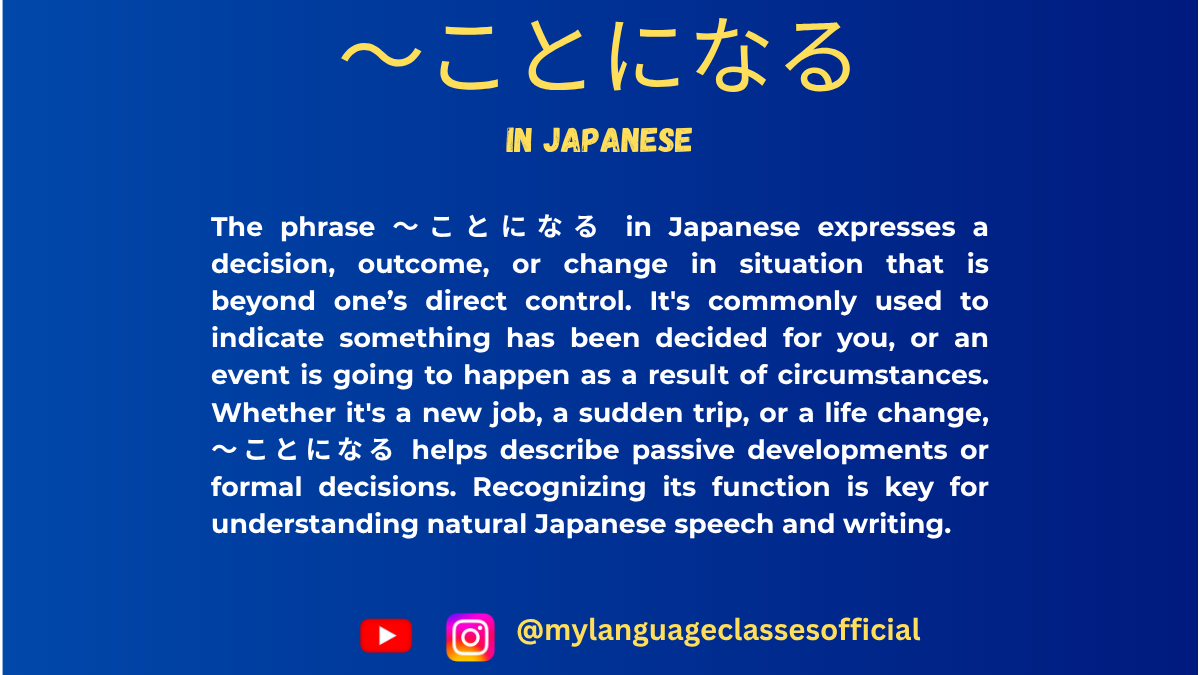
Understanding 〜ことになる in Japanese | My Language Classes
Understanding 〜ことになる
If you’re learning Japanese, you’ve likely come across the phrase 〜ことになる (koto ni naru). This grammatical structure is incredibly versatile and is used in various contexts to express outcomes, decisions, or natural conclusions. Whether you’re a beginner or an advanced learner, mastering 〜ことになる will significantly enhance your Japanese communication skills.
In this blog post, we’ll break down everything you need to know about 〜ことになる, including its formation, usage, and examples. Let’s dive in!
What Does 〜ことになる Mean?
The phrase 〜ことになる is used to indicate that something has been decided, arranged, or naturally resulted in a certain outcome. It often implies that the decision or outcome is beyond the speaker’s control or is a result of external circumstances. Think of it as expressing “it has been decided that…” or “it turns out that…” in English.
For example:
- 日本に留学することになりました。
(Nihon ni ryuugaku suru koto ni narimashita.)
It has been decided that I will study abroad in Japan.
This sentence suggests that the decision to study abroad was made, possibly by someone else or due to circumstances, rather than the speaker actively choosing it.
Formation of 〜ことになる
The formation of 〜ことになる depends on the type of word it follows: verbs, nouns, or adjectives. Here’s how it works:
1. With Verbs
- Verb (dictionary form) + ことになる
Example:- 行く (iku) → 行くことになる (iku koto ni naru)
- 食べる (taberu) → 食べることになる (taberu koto ni naru)
2. With Nouns
- Noun + になる
Example:- 先生 (sensei) → 先生になる (sensei ni naru)
- 休み (yasumi) → 休みになる (yasumi ni naru)
3. With Adjectives
- い-Adjective (remove い) + くなる
Example:- 高い (takai) → 高くなる (takaku naru)
- 楽しい (tanoshii) → 楽しくなる (tanoshiku naru)
- な-Adjective + になる
Example:- 静か (shizuka) → 静かになる (shizuka ni naru)
- 元気 (genki) → 元気になる (genki ni naru)
Usage of 〜ことになる
〜ことになる is used in various situations to express decisions, outcomes, or natural conclusions. Here are some common scenarios:
- Decisions Made by Others
- When someone else makes a decision that affects you.
Example: 来月転勤することになりました。
(Raigetsu tenkin suru koto ni narimashita.)
It has been decided that I will be transferred next month.
- When someone else makes a decision that affects you.
- Natural Outcomes
- When something happens as a natural result.
Example: 雨が降ったので、試合は中止することになりました。
(Ame ga futta node, shiai wa chuushi suru koto ni narimashita.)
Because it rained, the match has been canceled.
- When something happens as a natural result.
- Future Plans
- When talking about future plans or arrangements.
Example: 来週の会議は延期することになりました。
(Raishuu no kaigi wa enki suru koto ni narimashita.)
It has been decided that next week’s meeting will be postponed.
- When talking about future plans or arrangements.
- Unavoidable Situations
- When something is unavoidable or inevitable.
Example: 彼は仕事を辞めることになりました。
(Kare wa shigoto o yameru koto ni narimashita.)
He ended up quitting his job.
- When something is unavoidable or inevitable.
List of Verbs, Nouns, and Adjectives with 〜ことになる
Here’s a table with examples of verbs, nouns, and adjectives in their 〜ことになる form:
Type Word 〜ことになる Form Example Sentence (Romaji) Meaning in English Verb 行く (iku) 行くことになる 来月日本に行くことになりました。 It has been decided that I will go to Japan next month. 食べる (taberu) 食べることになる 彼は野菜しか食べないことになりました。 It has been decided that he will only eat vegetables. Noun 先生 (sensei) 先生になる 彼は来年先生になることになりました。 It has been decided that he will become a teacher next year. 休み (yasumi) 休みになる 明日は休みになることになりました。 It has been decided that tomorrow will be a day off. い-Adj 高い (takai) 高くなる 来月から家賃が高くなることになりました。 It has been decided that the rent will increase next month. 楽しい (tanoshii) 楽しくなる このイベントは楽しくなることになりました。 It has been decided that this event will be fun. な-Adj 静か (shizuka) 静かになる この部屋は静かになることになりました。 It has been decided that this room will be quiet. 元気 (genki) 元気になる 彼は手術後、元気になることになりました。 It has been decided that he will recover after the surgery.
More Example Sentences
Here are 10 more examples of 〜ことになる in action:
- 来週から新しいプロジェクトを始めることになりました。
(Raishuu kara atarashii purojekuto o hajimeru koto ni narimashita.)
It has been decided that I will start a new project next week. - 彼女は来月結婚することになりました。
(Kanojo wa raigetsu kekkon suru koto ni narimashita.)
It has been decided that she will get married next month. - この本は来年映画化することになりました。
(Kono hon wa rainen eiga-ka suru koto ni narimashita.)
It has been decided that this book will be adapted into a movie next year. - 来週のパーティーは中止することになりました。
(Raishuu no paatii wa chuushi suru koto ni narimashita.)
It has been decided that next week’s party will be canceled. - 彼は来年アメリカに引っ越すことになりました。
(Kare wa rainen Amerika ni hikkosu koto ni narimashita.)
It has been decided that he will move to America next year. - この商品は値上げすることになりました。
(Kono shouhin wa neage suru koto ni narimashita.)
It has been decided that this product will increase in price. - 来月から新しい制度が始まることになりました。
(Raigetsu kara atarashii seido ga hajimaru koto ni narimashita.)
It has been decided that a new system will start next month. - 彼は来週退院することになりました。
(Kare wa raishuu taiin suru koto ni narimashita.)
It has been decided that he will be discharged from the hospital next week. - この問題は解決することになりました。
(Kono mondai wa kaiketsu suru koto ni narimashita.)
It has been decided that this problem will be resolved. - 彼女は来年留学することになりました。
(Kanojo wa rainen ryuugaku suru koto ni narimashita.)
It has been decided that she will study abroad next year.
Things to Keep in Mind
- Politeness Level: 〜ことになる is neutral in tone. For formal situations, use 〜ことになります (koto ni narimasu) or 〜ことになりました (koto ni narimashita).
- Subject Implication: The subject of the sentence is often omitted in Japanese, so pay attention to context to understand who or what is being discussed.
- Natural Outcomes: 〜ことになる often implies that the outcome is natural or unavoidable, rather than a personal choice.
- Verb Tense: The verb before 〜ことになる is usually in the dictionary form, but the tense of the sentence depends on the context.
Fill in the Blanks
Test your understanding of 〜ことになる with these fill-in-the-blank questions:
- 来月、新しい仕事を______ことになりました。
(Raigetsu, atarashii shigoto o ______ koto ni narimashita.)
It has been decided that I will start a new job next month. - 彼は来年、大学を______ことになりました。
(Kare wa rainen, daigaku o ______ koto ni narimashita.)
It has been decided that he will graduate from university next year. - このイベントは______ことになりました。
(Kono ibento wa ______ koto ni narimashita.)
It has been decided that this event will be canceled. - 来週から、新しいルールが______ことになりました。
(Raishuu kara, atarashii ruuru ga ______ koto ni narimashita.)
It has been decided that a new rule will start next week. - 彼女は来月、______ことになりました。
(Kanojo wa raigetsu, ______ koto ni narimashita.)
It has been decided that she will get married next month. - この商品は______ことになりました。
(Kono shouhin wa ______ koto ni narimashita.)
It has been decided that this product will increase in price. - 彼は来年、______ことになりました。
(Kare wa rainen, ______ koto ni narimashita.)
It has been decided that he will move to America next year. - この問題は______ことになりました。
(Kono mondai wa ______ koto ni narimashita.)
It has been decided that this problem will be resolved. - 来週の会議は______ことになりました。
(Raishuu no kaigi wa ______ koto ni narimashita.)
It has been decided that next week’s meeting will be postponed. - 彼は手術後、______ことになりました。
(Kare wa shujutsu-go, ______ koto ni narimashita.)
It has been decided that he will recover after the surgery.
Answers:
- 始める (hajimeru)
- 卒業する (sotsugyou suru)
- 中止する (chuushi suru)
- 始まる (hajimaru)
- 結婚する (kekkon suru)
- 値上げする (neage suru)
- アメリカに引っ越す (Amerika ni hikkosu)
- 解決する (kaiketsu suru)
- 延期する (enki suru)
- 元気になる (genki ni naru)
Conclusion
Mastering 〜ことになる is a key step in becoming fluent in Japanese. This structure is essential for expressing decisions, outcomes, and natural conclusions in a variety of contexts. By understanding its formation and usage, you’ll be able to communicate more effectively and naturally in Japanese. Keep practicing with the examples and exercises provided, and soon you’ll be using 〜ことになる like a pro!
If you enjoyed this lesson, be sure to check out more posts like this on my blog at My Language Classes. Don’t forget to subscribe my YouTube channel and follow me on Instagram for the latest language learning tips and lessons. Leave a comment below to share your thoughts, or ask any questions you have about nouns.
Happy learning! 😊
- 日本に留学することになりました。
-
100 Example Sentences of Linking Verbs in English | My Language Classes
Linking Verbs in English
Linking verbs are a crucial part of English grammar, connecting the subject of a sentence to a subject complement that describes or identifies it. While understanding the concept of linking verbs is important, seeing them in action through examples can make their usage even clearer.
In this blog post, we’ve compiled 100 example sentences of linking verbs to help you grasp how they work in real-life contexts. Whether you’re a student, teacher, or language enthusiast, these sentences will serve as a valuable resource for learning and teaching.
Let’s dive into the examples!
100 Example Sentences of Linking Verbs
- She is a doctor.
- The cake smells delicious.
- He seems tired after work.
- The flowers look beautiful.
- I am a teacher.
- The soup tastes salty.
- They are my best friends.
- The weather feels cold today.
- The movie was boring.
- She became a lawyer last year.
- The children appear excited.
- The room remains quiet.
- The sky looks cloudy.
- He seems happy with the results.
- The music sounds relaxing.
- The dog is playful.
- The book was interesting.
- She feels nervous about the exam.
- The coffee tastes bitter.
- The house looks old.
- They were late to the party.
- The cake appears burnt.
- The teacher is kind.
- The soup smells amazing.
- He became a father last month.
- The flowers smell sweet.
- The idea sounds great.
- The fabric feels soft.
- The problem remains unsolved.
- The children stay calm.
- The weather stays warm.
- The cake looks delicious.
- She is a talented singer.
- The movie seems interesting.
- The pizza tastes cheesy.
- The dog seems friendly.
- The house appears empty.
- The sky became dark.
- The water feels cold.
- The story sounds fascinating.
- The room looks messy.
- The cake smells sweet.
- He is a professional athlete.
- The flowers look fresh.
- The soup tastes spicy.
- The music sounds loud.
- The weather feels humid.
- The book remains unfinished.
- The children seem happy.
- The house feels cozy.
- The cake appears perfect.
- The dog became restless.
- The teacher seems strict.
- The flowers smell lovely.
- The movie sounds exciting.
- The soup looks thick.
- The room feels warm.
- The cake tastes heavenly.
- The sky looks clear.
- The children appear curious.
- The weather feels chilly.
- The book sounds interesting.
- The house looks modern.
- The dog seems loyal.
- The teacher remains patient.
- The flowers look vibrant.
- The soup smells savory.
- The music sounds soothing.
- The cake feels soft.
- The sky appears blue.
- The children seem energetic.
- The weather feels pleasant.
- The book looks old.
- The dog appears hungry.
- The teacher sounds knowledgeable.
- The flowers smell fragrant.
- The soup tastes bland.
- The music sounds melodic.
- The cake looks moist.
- The sky feels vast.
- The children remain quiet.
- The weather feels unpredictable.
- The book seems fascinating.
- The dog looks tired.
- The teacher appears approachable.
- The flowers smell fresh.
- The soup tastes rich.
- The music sounds harmonious.
- The cake feels fluffy.
- The sky looks stunning.
- The children seem playful.
- The weather feels refreshing.
- The book remains popular.
- The dog seems protective.
- The teacher looks professional.
- The flowers smell delightful.
- The soup tastes flavorful.
- The music sounds rhythmic.
- The cake looks irresistible.
- The sky feels endless.
Conclusion
Linking verbs are simple yet powerful tools in English grammar, helping to connect subjects with their descriptions or identities. By studying these 100 example sentences, you can see how linking verbs function in various contexts and improve your understanding of their usage. Whether you’re writing, speaking, or teaching, these examples will serve as a handy reference. Keep practicing, and soon, using linking verbs will become second nature to you!
If you found this guide helpful, I’d love to hear from you! Share your thoughts in the comments below or connect with me on social media. For more tips, resources, and inspiration, visit my blog at mylanguageclassesblog.wordpress.com. Follow on Instagram and subscribe on YouTube

